 |
bostonbubble.com
Boston Bubble - Boston Real Estate Analysis
|
|
SPONSORED LINKS
Advertise on Boston Bubble
Buyer brokers and motivated
sellers, reach potential buyers.
www.bostonbubble.com
YOUR AD HERE
|
|
DISCLAIMER: The information provided on this website and in the
associated forums comes with ABSOLUTELY NO WARRANTY, expressed
or implied. You assume all risk for your own use of the information
provided as the accuracy of the information is in no way guaranteed.
As always, cross check information that you would deem useful against
multiple, reliable, independent resources. The opinions expressed
belong to the individual authors and not necessarily to other parties.
|
| View previous topic :: View next topic |
| Author |
Message |
admin
Site Admin
Joined: 14 Jul 2005
Posts: 1826
Location: Greater Boston
|
 Posted: Fri Aug 28, 2009 4:20 pm GMT Post subject: Boston Bubble Brief: The Real Story for MA - Jul 2009 Posted: Fri Aug 28, 2009 4:20 pm GMT Post subject: Boston Bubble Brief: The Real Story for MA - Jul 2009 |
 |
|
This is a brief report on what the data for the housing market in Massachusetts looks like in real terms. Market data is typically reported in nominal terms which can be misleading because it combines changes in housing values with changes in the value of the dollar. Correcting for inflation removes changes in the dollar as a factor and gives a more accurate picture of how housing values have changed. This report is based on the published data of the Massachusetts Association of Realtors, though it should be noted that the S&P/Case-Shiller Index is a superior data source.
The Massachusetts Association of Realtors released their data for July 2009 on Tuesday, August 25th. While the raw prices were provided in nominal terms, for this report they have been adjusted for inflation using the CPI Northeast Urban numbers available at http://www.bls.gov/cpi/ Adjusting for inflation produced the data represented by the graphs below. Prices for January 2003 and earlier have been estimated by applying the earliest reported median from The MAR, February 2003, against the S&P/Case-Shiller Index for the Boston area. Suggestions for improving this estimate are welcome.
Full Price History
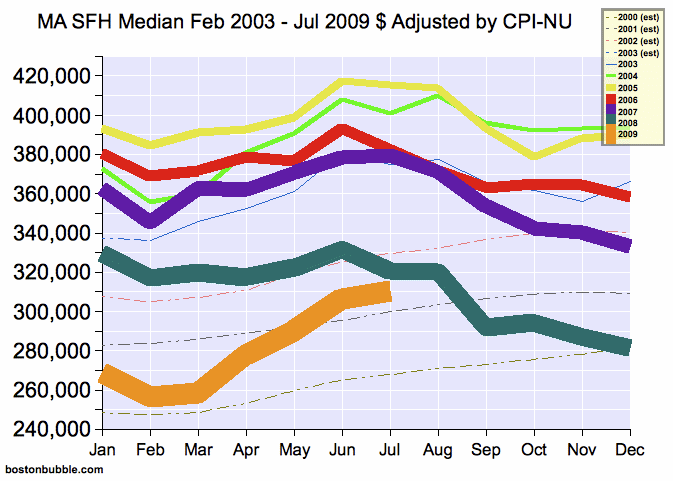
Change in Median Price From One Year Earlier, February 2004 - July 2009
Seasonal variations are removed by comparing prices from the same month in the prior year.
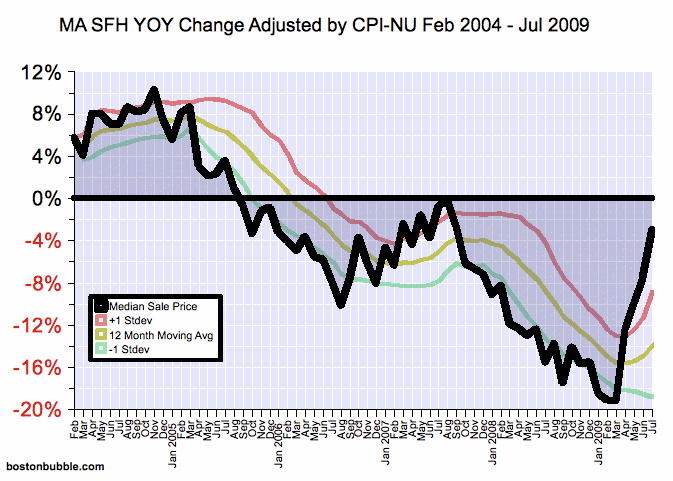
Some observations:
- The real decline from July 2008 to July 2009 was 3.24%.
- For the fourth month in a row, the year over year decline was above the normal range, with April being the first time since August 2007 that the decline has been one standard deviation or more above the moving average. This continues the abrupt departure from ever deepening declines which began in April and suggests that declines may be moderating.
- Real prices are once again lower than the same month in any other year in the time period covered by The MAR.
- Prices are now 25.69% below the peak set in June 2005. This is the result of a 17.06% decline in nominal housing prices and a 10.41% decline in the purchasing power of the dollar.
- The cumulative price decline from the beginning (Feb 2003) is 7.78%, which is an annualized decline of 1.25%.
- The price is above the estimate for the same month in 2001 for the second time since dipping below it last September.
Inflation has played a large part in this year's spring bounce. The year over year change in the CPI-NU was actually negative for the last four months, making the real decline in housing prices smaller than what has been reported by the media. This effect will be temporary, though, as the year over year decline in consumer prices is the result of a deflationary spike from last fall which has already run its course, as can be seen from the following graphs:
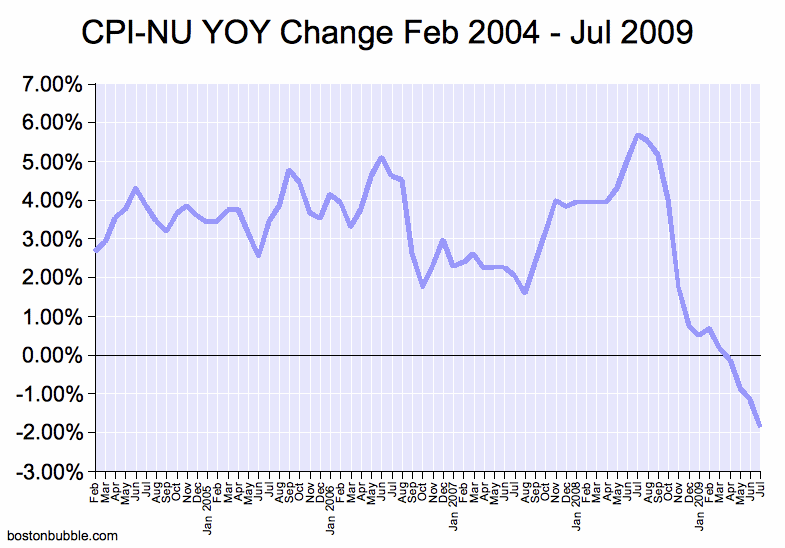
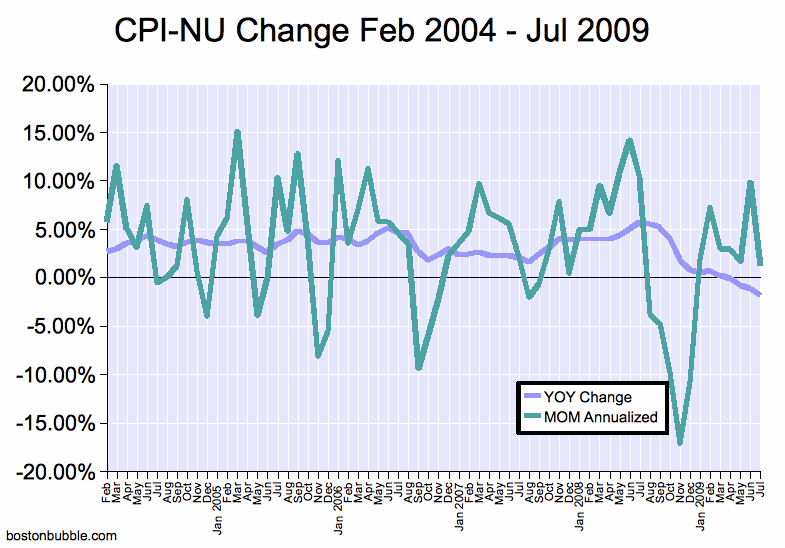
The temporary $8,000 US tax credit for home buyers has also likely distorted this year's spring bounce. At the most basic level, it plausibly added $8,000 to the price of homes near the Massachusetts median. However, its side effects may have been just as important, if not more so, in producing the appearance of a particularly large spring bounce. The tax credit in conjunction with the Massachusetts program to facilitate its use as a down payment surely expanded the pool of potential buyers to people who would have otherwise not been able to buy due to an insufficient down payment. It also probably caused a time shift of home purchases which would have been made anyway, pulling demand from the beginning of 2009 as well as next year and swelling demand this spring, summer, and fall. Depressed demand in the winter would have lowered prices there and increased demand in the spring and summer would have increased prices there, and so the apparent rise from winter to summer is artificially steepened. Finally, those who purchased before the credit took affect may have mentally discounted their offer prices to make up for the credit they would be missing.
The S&P/Case-Shiller Index for Boston is likely superior to the data above as it corrects for many flaws that are inherent when using only the median price. The S&P/Case-Shiller Index also has the advantage that futures contracts can be traded against it, thereby offering an unbiased insight into where housing prices are expected to be in the future. It also has more extensive historical data available. The MAR data was used for this report mainly out of inertia and might be replaced with the S&P/Case-Shiller Index in future reports.
As usual, please do try this at home. Double checking of the math used to construct the above graphs and analysis is strongly encouraged in order to help ferret out any errors. The data was derived from the following sources:
The text of this post and the associated graphs are Copyright 2009 by bostonbubble.com with all rights reserved, except as stated here. You may reproduce each graph individually or the text of the entire post as a whole (including graphs) under the Creative Commons Attribution-No Derivative Works 3.0 Unported License. You may additionally scale the graphs to fit your work. Alternatively, if you remove the bostonbubble.com signature from the bottom left hand corner of the images within this post, those modified images (and only those modified images) can then be distributed under the Creative Commons Attribution 3.0 Unported License. In all cases, attribution should be made via a hyperlink to http://www.bostonbubble.com/forums/viewtopic.php?t=2206 or http://www.bostonbubble.com/ Quoting excerpts of the text is also allowed provided that the quotes would normally fall under fair use. To request other terms for reproduction, please post your request in the original thread at http://www.bostonbubble.com/forums/viewtopic.php?t=2206
The latest version of this report can be found at http://www.bostonbubble.com/latest.php?id=ma_inflation
- admin |
|
| Back to top |
|
 |
admin
Site Admin
Joined: 14 Jul 2005
Posts: 1826
Location: Greater Boston
|
 Posted: Fri Aug 28, 2009 5:05 pm GMT Post subject: Posted: Fri Aug 28, 2009 5:05 pm GMT Post subject: |
 |
|
For strong evidence supporting the hypothesis that the somewhat larger than usual spring bounce this year is largely a result of the temporary tax credit, see the tiered S&P/Case-Shiller Index for Boston. The bounce is very pronounced in the low tier, where the credit would have the most impact, and practically absent in the high tier, where it would be a smaller percentage of the price and where many buyers would presumably be disqualified from the credit due to the associated income limits.
- admin
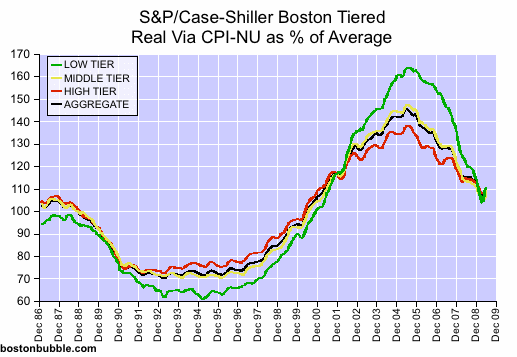
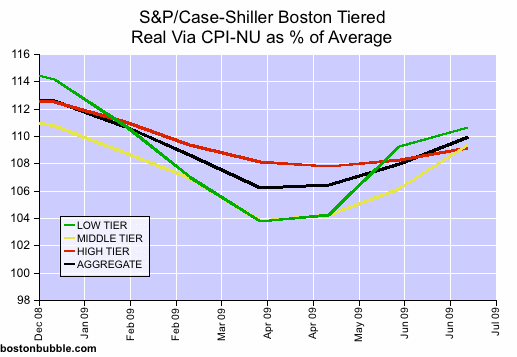 |
|
| Back to top |
|
 |
Renting in Mass
Joined: 26 Jun 2008
Posts: 381
Location: In a house I bought in December 2011
|
 Posted: Tue Sep 01, 2009 8:10 pm GMT Post subject: Posted: Tue Sep 01, 2009 8:10 pm GMT Post subject: |
 |
|
| I think you're right that the tax credit played a role in the large bounce, but to play devil's advocate, couldn't the fact that the bounce is more pronounced in the lower tier be attributed to pent up demand among first-time buyers (who tend to buy at the lower tier). I think first time buyers are nervous that the declines are over and they are going to get left behind if prices start to rise. I know I'm nervous. If you're already in a house you aren't as worried about jumping in at the first sign of an improvement in prices. If prices go up, your house gains value too. But if you're renting, rising prices are all downside. |
|
| Back to top |
|
 |
admin
Site Admin
Joined: 14 Jul 2005
Posts: 1826
Location: Greater Boston
|
 Posted: Wed Sep 02, 2009 12:10 am GMT Post subject: Posted: Wed Sep 02, 2009 12:10 am GMT Post subject: |
 |
|
| Renting in Mass wrote: | | I think you're right that the tax credit played a role in the large bounce, but to play devil's advocate, couldn't the fact that the bounce is more pronounced in the lower tier be attributed to pent up demand among first-time buyers (who tend to buy at the lower tier). I think first time buyers are nervous that the declines are over and they are going to get left behind if prices start to rise. I know I'm nervous. If you're already in a house you aren't as worried about jumping in at the first sign of an improvement in prices. If prices go up, your house gains value too. But if you're renting, rising prices are all downside. |
There are several reasons I wouldn't consider that likely, first and foremost being that the idea of pent up demand driving the market is bogus, at least in the way the concept is normally put forward. I think it's used as a scare tactic to pressure you into buying, precisely as you described, and that it is a convenient fiction. The reason I think that it is bogus is that there will always be unmet demand from people who want to buy but can't or don't. The real question is whether this unmet demand is higher than normal, because if it isn't, then there's no reason it would be propping up prices any more than normal. If there were actually pent up demand, I would expect the home ownership rate to be lower than the historical average. In fact, it's still above the historical average, so the numbers suggest exactly the opposite. Home ownership will continue to decrease, not increase, if history is a guide to what level is sustainable.
That said, this doesn't preclude the existence of pent up demand in some narrower segment, such as first time buyers, as you stated. However, for the market in general, if there were actually pent up demand for starter homes, that would imply an even greater over-saturation of demand for the rest of the market in order to arrive at the historically high ownership rate for the whole market. But if you're only concerned about starter homes, maybe that doesn't matter to you. It does sound plausible at least since people who are around my age (mid thirties) haven't had a good buying opportunity in their lifetimes yet, at least as far as many of the Boston suburbs are concerned. Still, I'd want to see data to back up this hypothesis. Glancing over the US Census Bureau's data, the home ownership rate for young families does not seem lower than normal, just from eyeballing it, but you're welcome to be more thorough:
http://www.census.gov/hhes/www/housing/hvs/prevqtrs.html
A separate reason that I don't believe that this spring bounce is a result of first time buyers panicking at price increases is that the bounce was too quick. I don't think there was sufficient time for news reports of rising prices to influence buyer psychology.
Furthermore, prices have bounced every spring. I really doubt buyers were influenced by rising month over month prices more this year than in other recent springs since all recent bounces have come in the midst of a broader downward trend.
- admin |
|
| Back to top |
|
 |
Guest
|
 Posted: Wed Sep 02, 2009 1:44 am GMT Post subject: Posted: Wed Sep 02, 2009 1:44 am GMT Post subject: |
 |
|
| Quote: | | Glancing over the US Census Bureau's data, the home ownership rate for young families does not seem lower than normal, just from eyeballing it |
Yeah, the 30-34 age bracket was 52% in 1995 and it's 52% now. That definitely doesn't suggest pent up demand. |
|
| Back to top |
|
 |
|
|
You can post new topics in this forum
You can reply to topics in this forum
You cannot edit your posts in this forum
You cannot delete your posts in this forum
You cannot vote in polls in this forum
|
Forum posts are owned by the original posters.
Forum boards are Copyright 2005 - present, bostonbubble.com.
Privacy policy in effect.
Powered by phpBB © 2001, 2005 phpBB Group
|








